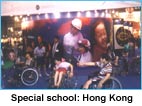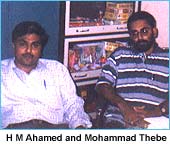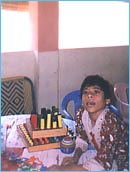A Ganesh Nadar
Just outside the main bus stop in Kayalpatnam, in Tamil Nadu, is an arch dedicated to the memory of Mahatma Gandhi. A hundred metres away is a small cherry-coloured gate leading to the Thulir School for Special Children.
The school has a large compound and small rooms. It has been built for mentally retarded children affected with cerebral palsy. It is an ordinary, simple school when viewed from the outside. But the miracles that happen inside are extraordinary.
Here is its story...
 The school -- inspired by a trip to faraway Hong Kong -- began with four children in 1999; today, it has 25 students.
The school -- inspired by a trip to faraway Hong Kong -- began with four children in 1999; today, it has 25 students.
But the Oondrekoal Rehab Trust that runs the school was set up in 1996 by seven persons. I met two of them.
H M Ahamed is a 34-year-old lawyer, while Mohammad Thebe, a commerce graduate working for Tuticorin Alkaline Chemicals, is just 30. Both are affected with polio in the right leg.
When asked why they were inspired to start something as large and ambitious as a school, they say: "We want to give self-confidence to the handicapped. We want them to be self-reliant."
 The fledgling idea took shape when Ahamed, who was in Hong Kong for a conference organised by the Rehabilitation International in August, 1998, visited a school for the mentally retarded. And came back very impressed.
The fledgling idea took shape when Ahamed, who was in Hong Kong for a conference organised by the Rehabilitation International in August, 1998, visited a school for the mentally retarded. And came back very impressed.
The school in Hong Kong, he remembers, was something special. Students were industriously engaged in creating packaging. And there was a constant demand for their work.
"India will soon be polio free, so we decided to work with the mentally disabled. More specifically, children affected with cerebral palsy," he says.
So Ahamed and his associates started the Thulir school in July 1999.
The students are charged a nominal fee -- ranging from Rs 25 to Rs 100 per month -- depending on the financial status of the family.
The trust's logic is simple. "We don't provide free schooling. Parents are aware of their responsibilities. When they spend so much money on their normal children's schooling, why not something for this child too?" he asks.
Every second Saturday, the school conducts parent-teacher meetings to coordinate the development of the child.
Unlike other schools, this one doesn't follow the usual kindergarten norms. It does not teach alphabets and addition or subtraction on coloured boards. Neither do its classrooms resound with kids reciting their ABCs or multiplication tables.
Thulir teaches its students self-sufficiency -- a trait that comes naturally to 'normal' children. But, for the mentally disadvantaged, it is a tough skill to master.
At the school, a child learns to become self-reliant in basic dressing, bathing and social interaction.
In adherence to the 'syllabus' chalked out by the National Institute for the Mentally Handicapped in Hyderabad, the books deal with skills like bathing, brushing, dressing, meal time skills, toilet training, social skills and fine motor skills.
 Medical treatment or surgery for children with cerebral palsy is not possible. Only skill training is. And that is what the Thulir school tries to do. The treatment includes stimulation and education from the earliest stage... an attempt to 'over'develop a limited potential.
Medical treatment or surgery for children with cerebral palsy is not possible. Only skill training is. And that is what the Thulir school tries to do. The treatment includes stimulation and education from the earliest stage... an attempt to 'over'develop a limited potential.
Teachers at Thulir, Ahamed explains, say that when students are absent for three or four days, they forget everything. So students are encouraged to come regularly.
A doctor comes once a month. A physiotherapist every week. A speech therapist, a psychiatric advisor and a psychiatric counsellor for the parents also drop in regularly.
I am taken to see the kids at Thulir. I am captivated.
Name: Marsuka
Age: 10
Her head is small and the brain, thus, is comparatively smaller. Her mental age is below normal. She needs custodial care; she cannot be left alone. Maruska has been attending classes for six months and smiles aimlessly. She knows her own name and understands simple commands like 'come' and 'go.'
Name: Sirajuddin
Age: 13
He has hydrocephalus -- an abnormal increase in the amount of cerebrospinal fluid resulting in the enlargement of the skull. He has been here for a year and is getting better.
Name: Mufrida
Age: Around 10
A very pretty child. She sits sipping water from her bottle as we speak. She is able to tell me her name. Mufrida went to an usual school till standard one. She does whatever she feels like doing. The school has asked her guardians to take her away since she is a mild case. She limps, as one leg is slightly shorter than the other. At Thulir, she is getting physiotherapy. They are also teaching her to write.
Name: Khathija
Age: 7
She has moderate cerebral palsy. She cannot stand on her own as her legs are weak. Undergoes physiotherapy. She says "Amma… Appa.. Vaa… Po" (mummy, daddy, come and
go).
Name: Sultan
Age: 13
He is very active and loves to run around. He acts like a bird and responds to the chirping of birds. "We have to tap one finger on the ground while he eats," explains the teacher. This is known as the Pierre Syndrome.
Name: Mohammad Ali
Age: 25
He is the oldest student in the school. He smiles and shakes hands with me. And speaks haltingly. He is receiving vocational training and is learning how to cut and paste pictures. He can identify colours.
The teachers who look after Khathija, Sultan, Mufrida and their peers come from simple backgrounds. But their dedication is impressive.
Memy did her balasevak training after finishing her SSC. She then worked in a 'normal' school for 10 years. "I worked as a kindergarten teacher," she says, even as she admits that she is happier here. "There is a feeling of social service that makes you happy."
Padma has studied upto class VIII, after which she did a one-month course in child rehabilitation. She says: "More than
training, experience is important." She keeps the children occupied by making them cut and paste pictures of colourful flowers, birds and cars.
K Suyambukani has completed her HSC and then worked in a hospital for five years. She has been here for a year and a half. "The children improve after they come here. But we have to be alert all the time. You cannot leave the kids alone. Yet, our aim is to make them independent."
A video cassette was playing in the television room. The film showed a young man who spoke with great difficulty. He had a small shop financed by a bank loan. The handicapped man was talking about how he would repay the loan.
Through such little stories, the teachers try to inspire the kids here. After all, this is the aim of this school for special children... this place of miracles.
Photographs: A Ganesh Nadar
Project Hope
The Rediff Specials